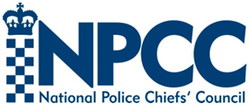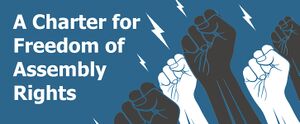National Police Chiefs' Council
 | |
| Abbreviation | NPCC |
| Predecessor | Association of Chief Police Officers |
| Formation | 2015 |
The National Police Chiefs' Council (NPCC) was set up in 2015 to represent British police chiefs and act as a national co-ordinating body for some police activities. It replaces the former Association of Chief Police Officers (ACPO), following the Parker Review of the operations of ACPO which recommended its replacement.[1][2][3]
The NPCC is not a legal entity in its own right but a collaboration that is funded by police forces in England, Wales and Northern Ireland as well as the armed services and some British overseas territories, who collectively run and fund it under the terms of Section 22A of the Police Act 1996.[4][5] It is hosted by the Metropolitan Police Service.
Leadership
The NPCC's first chair, former Chief Constable of the Thames Valley Police Sara Thornton, was appointed on 2 December 2014.[6] The current chair is Martin Hewitt, who was previously vice-chair (2015-2019).[7]
Projects
The NPCC operates and/or collaborates with the following police projects:
- ACRO Criminal Records Office (ACRO)
- AVCIS Vehicle Crime Intelligence Service (AVCIS)
- National Ballistics Intelligence Service (NABIS)
- National Domestic Extremism and Disorder Intelligence Unit (NDEDIU)
- National Police Coordination Centre (NPoCC)
- National Police Freedom of Information and Data Protection Unit (NPFDU)
- National Wildlife Crime Unit (NWCU)
- Secured by Design
- UK National Counter Terrorism Policing HQ (NCTP HQ)
Action by Netpol
In March 2021, the Network for Police Monitoring announced a day of online action on Friday 19 March 2021:
The decision to arrest organisers at the #ReclaimTheStreets protests was made by police.
It was the National Police Chiefs’ Council (NPCC), not the Home Secretary or the courts, which told police forces last week that they could not waive lockdown guidance and must make arrests at #ReclaimTheStreets vigils.
And it’s senior police officers who have lobbied for far-reaching new powers in the Police, Crime, Sentencing and Courts Bill currently making its way through parliament. Opposing this legislation is not enough. Parliament can give the police more powers, but it is police commanders who decide how to use them.
We’re calling a day of online action on Friday 19 March. We’ll be contacting the National Police Chiefs' Council to demand they protect the freedom to protest by adopting Netpol’s Charter for Freedom of Assembly Rights. Will you join us?
Sign up to Netpol and get action resources sent straight to your inbox.
Time and again, the police have shown themselves utterly incapable of protecting our rights. From the violent response to black-led protests during the 2020 Black Lives Matter uprisings to the systematic targeting of organisers for harassment, surveillance and arrest, the police have consistently abused the powers they already have.
It’s time the police committed to respecting Britain’s existing human rights commitments by adopting the Charter – or explained to the public why they refuse to do so.[8]
See also
- Operation Hydrant
Wikipedia is not affiliated with Wikispooks. Original page source here
References
- ↑ "Acpo overhaul needed, says general's report for PCCs"
- ↑ "Independent review of ACPO"
- ↑ "ACPO chief Orde to quit as police organisation scrapped"
- ↑ "National Police Collaboration Agreement – in relation to the setting up of a Co-ordinating Body known as the National Police Chiefs’ Council (NPCC)"
- ↑ "Business begins at the National Police Chiefs’ Council"
- ↑ "Sara Thornton to lead National Police Chiefs' Council"
- ↑ "NPCC Leadership"
- ↑ "Charter for Freedom of Assembly Rights"
